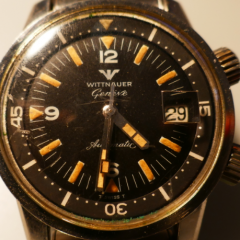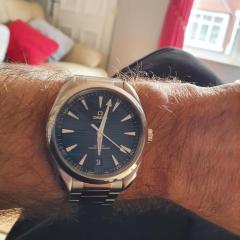Can extraction gassoline disolve shelac?
-
Recently Browsing
- No registered users viewing this page.
-
Topics
-
Posts
-
By RichardHarris123 · Posted
I'm assuming that every time you set the watch you are work hardening the detent spring, maximum hardening is where it meets the plate due to maximum deflection. That's why it snaps there. The Young's modulus may be the same but after it's reached its maximum yeid strength it breaks. My mechanic engineering is very rusty, correct me if I'm wrong. -
By Neverenoughwatches · Posted
Ah ok yes that makes sense to polish it where the arm starts to form from the body of the bridge, i thought you meant the underneath of all the arm. -
this is something I've never quite understood about the some of the Swiss companies. In 1957 Omega was using 9010 for the keyless parts with epilam. there's been a slow migration towards using heavier lubrication's but still typically oils and epilam to keep them in place. When it seems like 9504 works so much better.
-
By nevenbekriev · Posted
OK, welcome in the world of alarm clocks... I guess the 4th wheel is dished because it is from another movement. If it was not dishet, then it would not mesh with the pinion of the escape wheel, am I right? The marks of wear on the 4th wheel pinion doesn't corespond to the 3th wheel table position, at list this is what i see on the picts. Calculating the rate is easy - there is a formula - BR = T2 x T3 x T4 x T5 x 2 /(P3 x P4 x P5) where T2 - T5 are the counts of the teeth of the wheels tables, and P3 - P5 are the counts of the pinion leaves. Vibrating the balance is easy - grasp for the hairspring where it should stay in the regulator with tweasers, let the balance hang on the hairspring while the downside staff tip rests on glass surface. Then make the balance oscillate and use timer to measure the time for let say 50 oscillations, or count the oscillations for let say 30 seconds. You must do the free oscillations test to check the balance staff tips and the cone cup bearings for wear. This kind of staffs wear and need resharpening to restore the normal function of the balance. -
By RichardHarris123 · Posted
Glue a nut to the barrel lid, insert a bolt, pull, disolve the glue. Maybe someone will have a better answer.
-






Recommended Posts